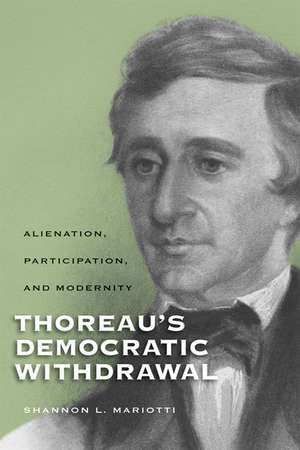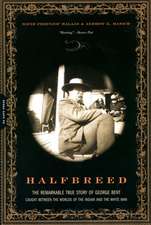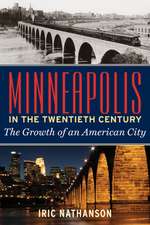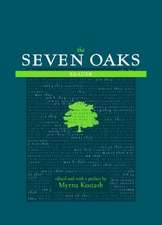Thoreau’s Democratic Withdrawal: Alienation, Participation, and Modernity: Studies in American Thought and Culture
Autor Shannon L. Mariottien Limba Engleză Paperback – 21 ian 2010
Best known for his two-year sojourn at Walden Pond in Massachusetts, Henry David Thoreau is often considered a recluse who emerged from solitude only occasionally to take a stand on the issues of his day. In Thoreau’s Democratic Withdrawal, Shannon L. Mariotti explores Thoreau’s nature writings to offer a new way of understanding the unique politics of the so-called hermit of Walden Pond. Drawing imaginatively from the twentieth-century German social theorist Theodor W. Adorno, she shows how withdrawal from the public sphere can paradoxically be a valuable part of democratic politics.
Separated by time, space, and context, Thoreau and Adorno share a common belief that critical inquiry is essential to democracy but threatened by modern society. While walking, huckleberrying, and picking wild apples, Thoreau tries to recover the capacities for independent perception and thought that are blunted by “Main Street,” conventional society, and the rapidly industrializing world that surrounded him. Adorno’s thoughts on particularity and the microscopic gaze he employs to work against the alienated experience of modernity help us better understand the value of Thoreau’s excursions into nature. Reading Thoreau with Adorno, we see how periodic withdrawals from public spaces are not necessarily apolitical or apathetic but can revitalize our capacity for the critical thought that truly defines democracy.
In graceful, readable prose, Mariotti reintroduces us to a celebrated American thinker, offers new insights on Adorno, and highlights the striking common ground they share. Their provocative and challenging ideas, she shows, still hold lessons on how we can be responsible citizens in a society that often discourages original, critical analysis of public issues.
Separated by time, space, and context, Thoreau and Adorno share a common belief that critical inquiry is essential to democracy but threatened by modern society. While walking, huckleberrying, and picking wild apples, Thoreau tries to recover the capacities for independent perception and thought that are blunted by “Main Street,” conventional society, and the rapidly industrializing world that surrounded him. Adorno’s thoughts on particularity and the microscopic gaze he employs to work against the alienated experience of modernity help us better understand the value of Thoreau’s excursions into nature. Reading Thoreau with Adorno, we see how periodic withdrawals from public spaces are not necessarily apolitical or apathetic but can revitalize our capacity for the critical thought that truly defines democracy.
In graceful, readable prose, Mariotti reintroduces us to a celebrated American thinker, offers new insights on Adorno, and highlights the striking common ground they share. Their provocative and challenging ideas, she shows, still hold lessons on how we can be responsible citizens in a society that often discourages original, critical analysis of public issues.
Din seria Studies in American Thought and Culture
-
 Preț: 212.38 lei
Preț: 212.38 lei -
 Preț: 172.18 lei
Preț: 172.18 lei -
 Preț: 155.96 lei
Preț: 155.96 lei -
 Preț: 145.83 lei
Preț: 145.83 lei -
 Preț: 244.08 lei
Preț: 244.08 lei -
 Preț: 279.67 lei
Preț: 279.67 lei -
 Preț: 222.55 lei
Preț: 222.55 lei - 11%
 Preț: 206.75 lei
Preț: 206.75 lei -
 Preț: 182.69 lei
Preț: 182.69 lei -
 Preț: 257.78 lei
Preț: 257.78 lei -
 Preț: 231.97 lei
Preț: 231.97 lei -
 Preț: 258.48 lei
Preț: 258.48 lei -
 Preț: 309.44 lei
Preț: 309.44 lei -
 Preț: 233.89 lei
Preț: 233.89 lei -
 Preț: 196.94 lei
Preț: 196.94 lei - 11%
 Preț: 230.50 lei
Preț: 230.50 lei - 11%
 Preț: 229.11 lei
Preț: 229.11 lei - 12%
 Preț: 267.58 lei
Preț: 267.58 lei
Preț: 191.22 lei
Nou
Puncte Express: 287
Preț estimativ în valută:
36.60€ • 39.77$ • 30.77£
36.60€ • 39.77$ • 30.77£
Carte tipărită la comandă
Livrare economică 21 aprilie-05 mai
Preluare comenzi: 021 569.72.76
Specificații
ISBN-13: 9780299233945
ISBN-10: 0299233944
Pagini: 264
Dimensiuni: 152 x 229 x 16 mm
Greutate: 0.34 kg
Ediția:1
Editura: University of Wisconsin Press
Colecția University of Wisconsin Press
Seria Studies in American Thought and Culture
ISBN-10: 0299233944
Pagini: 264
Dimensiuni: 152 x 229 x 16 mm
Greutate: 0.34 kg
Ediția:1
Editura: University of Wisconsin Press
Colecția University of Wisconsin Press
Seria Studies in American Thought and Culture
Recenzii
“Beautifully analyzes the implications of Thoreauvian withdrawal for modern politics and reminds us that the construction of the democratic city requires the cultivation of intellectually critical yet spiritually self-trusting democratic souls.”—Jack Turner, University of Washington
“Mariotti’s crisp and engaging book will make you think again about who Thoreau is and what difference he makes to democratic theory. By means of the surprising but highly productive pairing of Thoreau with Adorno, Mariotti reveals the political value of withdrawing from the glare of publicity in order to recover the capacity to think and act against the grain.”—Jane Bennett, author of Vibrant Matter: A Political Ecology of Things
“Shannon Mariotti joins the ranks of Stanley Cavell, George Kateb, and Jane Bennett with this remarkable rethinking of Thoreau. Her creative use of Adorno’s critical perspective, brought to bear on the conventional understanding of Thoreau’s supposed antisocial bias, allows us to think again about his vision, one that is not simply democratic, but tragically so.”—Thomas Dumm, author of Loneliness as a Way of Life
Notă biografică
Shannon L. Mariotti is assistant professor of political science at Southwestern University, Texas.
Cuprins
Preface: Reclaiming Spaces of Withdrawal for Democratic Politics
Acknowledgments
Introduction: Reading Thoreau with Adorno
Part 1. Two Interlocutors for Thoreau: Adorno and Emerson
1 Damaged Life, the Microscopic Gaze, and Adorno's Practice of Negative Dialectics
2 Alienated Existence, Focal Distancing, and Emerson's Transcendental Idealism
Part 2. Thoreau's Democratic Withdrawal
3 Man as Machine: Thoreau and Modern Alienation
4 Huckleberrying Toward Democracy: Thoreau's Practices of Withdrawal
5 Traveling Away from Home: Thoreau's Spaces of Withdrawal
Conclusion: Alienation and the Anti-Foundationalist Foundation of the Self
Notes
Bibliography
Index
Acknowledgments
Introduction: Reading Thoreau with Adorno
Part 1. Two Interlocutors for Thoreau: Adorno and Emerson
1 Damaged Life, the Microscopic Gaze, and Adorno's Practice of Negative Dialectics
2 Alienated Existence, Focal Distancing, and Emerson's Transcendental Idealism
Part 2. Thoreau's Democratic Withdrawal
3 Man as Machine: Thoreau and Modern Alienation
4 Huckleberrying Toward Democracy: Thoreau's Practices of Withdrawal
5 Traveling Away from Home: Thoreau's Spaces of Withdrawal
Conclusion: Alienation and the Anti-Foundationalist Foundation of the Self
Notes
Bibliography
Index
Descriere
Best known for his two-year sojourn at Walden Pond in Massachusetts, Henry David Thoreau is often considered a recluse who emerged from solitude only occasionally to take a stand on the issues of his day. In Thoreau’s Democratic Withdrawal, Shannon L. Mariotti explores Thoreau’s nature writings to offer a new way of understanding the unique politics of the so-called hermit of Walden Pond. Drawing imaginatively from the twentieth-century German social theorist Theodor W. Adorno, she shows how withdrawal from the public sphere can paradoxically be a valuable part of democratic politics.












